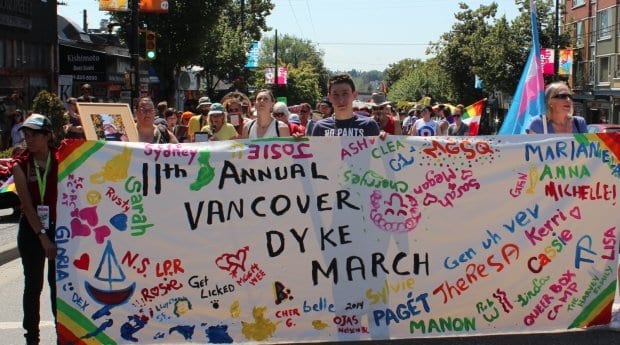It’s a funny thing about the Dyke March: it’s unquestionably popular and an important addition to Pride weekend in Vancouver, yet organizers consistently struggle to fill the board of directors.
This year was no exception. With three of the board’s four remaining directors stepping down to focus on other aspects of their lives, there was a real concern that the Dyke March would be left with just one director.
Thankfully, that didn’t happen. A handful of community members stepped up to join the board at the annual general meeting March 1, once again swelling its ranks to seven seats filled and ensuring that the annual women’s march and festival will survive another year.
But why does it so often come to this?
Within just four years of its enthusiastic, post-1990s reboot in 2004, Vancouver’s Dyke March had slipped into a recurring pattern. By 2008, the board had dwindled to just four directors. Though it doubled in size again at that year’s annual general meeting, the pattern would repeat several times, notably in 2011 (when the directors appealed for community support and held a town hall to solicit suggestions) and again this year.
It’s not because queer women have lost interest in the Dyke March. Hundreds of women marched up Commercial Drive last year and organizers estimate that up to 2,400 women attended the post-march festival in Grandview Park on Aug 2, 2014.
“It’s amazing how the community comes together on the day,” says outgoing Dyke March president Michelle Fortin. “It is a little curious that we don’t get more women out to participate in the development and governance of it. It’s just a curiosity, not a judgment,” she hastens to add.
I’m not judging either. I know people are busy and, let’s be honest, I don’t personally feel like sitting on a board and I don’t feel too comfortable pressuring others to give what I won’t. But without directors, sooner or later the Dyke March will fizzle.
Part of the problem could be complacency. It’s easy in a city as welcoming as Vancouver for some people to “lose sight of why it’s important that we are still active and political,” Fortin says. “I’m not fighting for my rights, but I absolutely am standing steadfast and holding space in the broader community for queer voice.”
Part of the problem could be that young women eager to volunteer can only commit for so long before they graduate, change careers or move away. Fortin calls it the “transient nature of youthful energy.” That’s no reason to shy away from welcoming younger women to the board; it just might require more strategy to balance their valuable input with more continuity from longer-term directors.
Socioeconomic pressures could play a part too, suggests outgoing board member Marianela Ramos-Capelo. An international student from Mexico, she values the Dyke March, its welcoming environment, and its commitment to taking up space “here, where we live” on the Drive. But she has to focus on school and her finances now, and can no longer volunteer the hours it takes to sit on the board.
Of course the challenge of recruiting directors is not unique to the Dyke March. The Pride Society faced similar challenges for years and only recently seems to have turned a corner with its transition away from a working board to paid staff. But in a community survey of approximately 77 people conducted by the Dyke March last year, only 11.4 percent of respondents said they would be willing to sit on the board.
For whatever combination of reasons, women enjoy attending the event but few have any interest in organizing it.
Maybe part of the answer starts with a simple thank you — to the women who have given so much of their time to create a space for the rest of us, especially last year’s board members who organized through tears after a sudden death in their ranks left them grief-stricken.
Ramos-Capelo is happy to see new people once again stepping up to fill the board’s empty seats. “I wish the community got as excited as we are,” she says, “not just to show up but to make it with us.”
Robin Perelle is the managing editor of Daily Xtra in Vancouver.

 Why you can trust Xtra
Why you can trust Xtra


